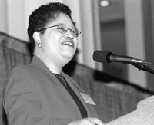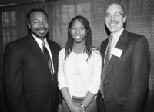President Charles M. Vest and keynote speaker Dr. Shirley Ann Jackson, president of Rennselaer Polytechnic Institute (RPI), both discussed the need to improve the learning environment and academic success of minority students in American universities at MIT's 26th annual Dr. Martin Luther King Jr. Celebratory Breakfast last Thursday.
Hosted by President and Mrs. Rebecca Vest, this year's celebration had the theme "Engineering Bold Leadership for the 21st Century/A Blueprint for Full Participation in Academia, Government and Industry."
Presidents Vest and Jackson both referred to The Shape of the River by William Bowen and Derek Bok, which describes the success of three decades of affirmative action in higher education. The book also contains a troubling finding: statistically, many minority students are not reaching their full academic potential -- this, said Dr. Vest, "at a time when we need them to be the best they can be as they prepare to be our leaders in this new century of American life."
MIT was not part of the study in the Bowen/Bok book, "but we must examine this question in a substantive manner here as well... We need to understand what is going on and then roll up our sleeves and get to work on it," he told the audience of about 400 invited guests in Morss Hall. "After all, at MIT we like to think that once we've identified a problem, we've taken the first step in finding a solution."
President Vest cited three areas of concern and opportunity: mentoring, community and expectations.
Noting that minority students were less inclined to participate in UROP, a prime opportunity to develop mentoring relationships, he said, "we need to understand why, and correct it." He added that this is a high priority for Dean for Undergraduate Research Kim Vandiver.
President Vest also noted the importance of developing a stronger learning community and observed that students from all cultures develop a sense of community cohesiveness in such activities as the Leadershape program. "We need to build on the lessons we are learning from this kind of experience and make them available to all of our students," he said.
On the matter of expectations, he pointed out that in the videotape series It's Intuitively Obvious, minority students said teachers frequently send signals that their expectations for minority students are lower than the students have for themselves. "Our expectations of our students and of ourselves must be high," President Vest said. Noting that the Committee on Campus Race Relations is making an updated version of those tapes, he added, "Let's learn from our students. It's all right there."
He closed his remarks by announcing plans to appoint a results-oriented task force to address the issues of expectations and academic performance of MIT's minority students and how their environment and success can be improved.
"By building an MIT that is not only inclusive but sustaining, we can take a big step forward to creating a better learning and living environment for all of us," he said. "Such a community must be based on equal opportunity, to be sure. And it must continue to be one of supremely ambitious, talented and hard-working individuals. But it also must be one of mutual respect, self-confidence, shared purpose and high expectations."
JACKSON'S REMARKS
Dr. Jackson, former chair of the Nuclear Regulatory Commission, said RPI is developing strategies based on community and diversity ("communiversity," she called it).
"To be competitive in the 21st century, our universities must reflect the society we hope to serve and to lead, and we must develop multicultural awareness among our students," said Dr. Jackson, who earned the SM (1968) and PhD (1973) at MIT, both in physics.
She noted that the cultures in competitive universities often view "excellence and caring" as an oxymoron. "This is not so," she said. "If we admit the best students, we cannot squander the talent. We must have an equal commitment, as universities, to their academic and life success."
President Jackson urged universities, "especially highly selective ones," to offer instruction in math and science to low-income students as early as the seventh grade, as RPI already does in its community. "One cannot aspire to be a scientist, engineer, entrepreneur or technological leader without a grounding in calculus," she said. "One cannot do calculus if one cannot do geometry, trigonometry and algebra."
She also urged universities and industry to join in making teaching an attractive career for talented individuals. "The enthusiasm and excitement the teachers develop through their own relevant experiences will translate into a more vibrant and exciting class for our students," she said.
President Jackson noted that she learned many important lessons dur- ing her MIT days as a volunteer at Boston City Hospital, a tutor at the Roxbury YMCA or planning events for her sorority, Delta Sigma Theta. "Those lessons -- the lessons of humanity and humility, of organization, of realizing that another's struggles can be greater than one's own -- helped me to become a better human being, and consequently contributed to the successes I have attained," she said.
Before Presidents Vest and Jackson spoke, mechanical engineering sophomore Ebraheem Fontaine and electrical engineering and computer science graduate student Tamara Williams offered their personal reflections on Dr. King's life and legacy.
Noting the misperceived image of young black males as "public enemy number 1" in some circles, Mr. Fontaine urged his peers to follow Dr. King's example of commitment to justice while asserting their manhood. "As college students, we are in a position to have a strong influence," he said.
Ms. Williams noted that Dr. King did not waver in his commitment, even though he was aware of the possibility that he might be killed for it. He set an example when "he refused to stray from the path of equality and justice for all," she said.
LEADERSHIP AWARDS
Other features of the program included the presentation of this year's Dr. Martin Luther King Jr. Leadership Awards to Professor Rafael Bras, materials science and engineering senior Ticora V. Jones and NASA administrator Woodrow Whitlow Jr. (SB 1974, SM, PhD). These awards were presented by Chancellor Lawrence S. Bacow.
Professor Bras, head of the Department of Civil and Environmental Engineering, was nominated by senior Jeriel Rivera, president of the MIT chapter of the Society of Hispanic Professional Engineers (SHPE), who said: "The leadership and integrity Professor Bras has demonstrated during his 24 years as a professor deserve special recognition. His interaction with members of SHPE and his continuous support of minorities at MIT should be commended." In accepting the award, Professor Bras urged the audience to "have faith... rationality will prevail."
Ms. Jones, co-founder of the Black Women's Alliance of MIT, has been a group facilitator and tutor for the Office of Minority Education, winning the Tutor of the Year award. She is a National Merit and National Achievement Scholar and a member of the National Society of Black Engineers. Ms. Jones told her fellow students: "Let us lead by example."
Dr. Whitlow was honored for developing research partnerships among NASA centers, industry and historically black colleges and universities and directing doctoral and master's theses.
"Woody's actions have remained consistent with Dr. King's model for excellence in one's profession and for personal involvement and commitment to enhance the brotherhood of humankind," said Professor Wesley Harris of aeronautics and astronautics, Dr. Whitlow's advisor at MIT, who made the nomination. Dr. Whitlow, Professor Harris's first PhD student, remembered Dr. Jackson as a graduate student who could "strike more fear into the hearts of us than the average professor."
The MIT Gospel Choir performed Lift Every Voice and Sing. Rev. Jane Gould, MIT's Lutheran chaplain, offered the invocation and benediction. The mistress of ceremonies was Carla Merritt, a junior in chemical engineering.
A version of this article appeared in MIT Tech Talk on February 9, 2000.








